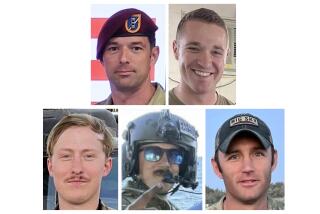U.S. Creates Medical Teams for Terrorist Crises
- Share via
WASHINGTON — The Defense Department, acting upon lingering criticism arising from its response to the 1983 terrorist bombing that killed 241 U.S. servicemen in Beirut, said Tuesday that it has established special medical emergency teams that can be deployed instantly in the event of a terrorist act.
“Terrorist activity is a new form of warfare, and a real form of warfare capable of generating large numbers of injured people,” Dr. William Mayer, assistant secretary of defense for health affairs, said at a news conference.
Several years ago, Mayer said, the Pentagon did not have the capability to respond to such a medical crisis but “we do now.”
Series of Critical Reports
In part, the medical crisis teams are a response to a series of internal Pentagon reports critical of the military’s medical readiness in the event of war, as well as to its handling of medical emergencies after the Oct. 23, 1983, bombing of the Marine headquarters in Beirut.
In September, Defense Secretary Caspar W. Weinberger ordered the armed services to make wartime medical preparedness, rather than peacetime health care, its first priority. A review of the entire medical system is now being conducted, Mayer said, including an examination of the recruitment of medical specialists and the location and numbers of hospital beds and medical equipment.
“Beirut dramatized for us that there could be hundreds of casualties all at once,” Mayer said. “It illustrated that kind of incident could have happened at any place where there are a large number of Americans.”
Based in Europe
The medical crisis teams, established by each service, are based in Europe and are under command of a joint Crisis Action Team at the U.S. European military headquarters in Stuttgart, West Germany.
The teams can be activated “instantly,” he said, adding: “The system is well in place and able to deal with any medical crisis.”
Mayer said the teams were all alerted during the spate of terrorist activities that have taken place since last summer. These include the hijacking in June of TWA Flight 847 to Beirut, the seizing of the Italian cruise ship Achille Lauro off Egypt in October and the recent hijacking of an Egyptian airliner that resulted in 60 deaths.
He said the teams did not respond after the storming of the Egyptian jet in Malta because “it was not required. There was adequate medical care available.”
“Air Ambulances”
There are 16 medical teams with 272 surgeons, physicians, nurses and support personnel, as well as eight Air Force, seven Navy and one Army “air ambulance” outfits, according to a Pentagon official.
Mayer said that the Army has developed a triage team trained to make “instant medical judgments,” as well as a 100-bed deployable hospital with 130 staff members and two operating rooms.
The Navy has two surgical teams, with a surgeon, an orthopedic specialist, an anesthesiologist and several nurses, Mayer said. The Air Force has four surgical teams, called “flying ambulances,” as well as four air-transportable hospitals, he said.
Although Mayer acknowledged the Beirut attack as the motivation for the creation of the new medical teams, he nevertheless defended the behavior of medical personnel during that emergency.
“Most of the casualties were dead; less than 100 needed medical attention,” he said. “We were able to get our hands on all casualties quickly enough. . . . We were able to deal with it.”
More to Read
Sign up for Essential California
The most important California stories and recommendations in your inbox every morning.
You may occasionally receive promotional content from the Los Angeles Times.













